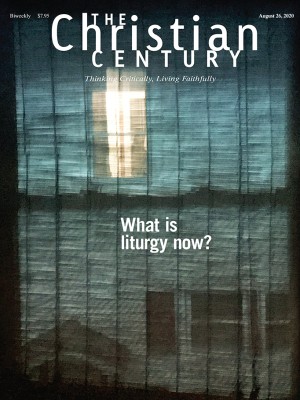“Owe no one anything, except to love one another,” Paul writes. The Ten Commandments and the whole of the first covenant’s law are fulfilled in this single commandment to love. Love your neighbor as yourself, and you will have manifested the will of God.
But the closer we get to November’s election, the harder this commandment seems. Loving our neighbor sounds plausible in a world where everyone sees eye to eye, agrees on what is right and wrong, and respects the same measures of fairness and equity. Loving our neighbor sounds possible when we share common values and rules of play, when we trust the neighbor’s good intentions, when we respect the same measures of justice.
Read our latest issue or browse back issues.
It gets dicey when these presumptions are stripped away. When one neighbor prioritizes the freedom to bear arms as an inalienable right, and another neighbor cherishes the freedom to wed their same-sex partner, and neither understands the other; when one neighbor promotes individual responsibility to earn a living, and another neighbor advocates minimum wage and health care for all, and neither trusts the other. It is harder still when public leaders stoke the fires of distrust and contempt. What does it mean to love our neighbor in times like these?
It helps to remember that in Paul’s time, Rome was not exactly a homogeneous community. Deeply divided between wealthy and impoverished, Rome also included people from myriad different religious and philosophical expressions, as well as émigrés from across the empire. All residents lived under the law of the empire—with significant expectations of political patronage. Fairness, equity, and justice were shrouded under the cloud of owing favors.
How, then, did Paul expect the Christians in first-century Rome to forgo owing anyone patronage and instead love their neighbor—any neighbor, regardless of social rank, political loyalty, country of origin, philosophy, or religion?
The answer, it seems, is found in the surrounding verses. Immediately prior to this instruction not to owe others anything, Paul names overtly how very much is owed by residents of Rome to the empire. The governing authorities expected loyalty, and Paul offers an exacting list of what one owes them: “pay taxes to whom taxes are due, revenue to whom revenue is due, respect to whom respect is due, honor to whom honor is due” (13:7). For Christians living in the Roman Empire, fraught with patronage systems, maintaining integrity in faith while navigating the political world was not easy. Refraining from paying taxes or patronage put one in harm’s way. Paul essentially tells them not to fight it; instead, keep an eye on what is good (13:3). Leaders who themselves are committed to good are blessed by God, regardless of their religious or political affiliation.
For our time, this is an instruction not to dismiss the use of political leaders of other persuasions as de facto hands of the devil. Some, indeed, do good. For us to wrap ourselves in the cloak of righteousness is to miss seeing the possibility that the work of God can happen through secular leaders, that the justice desired by God can be fulfilled through politicians of different stripes, that the love of neighbor prescribed by God can be evidenced through those with whom we (even virulently) disagree.
But that, in itself, is not solace enough. Immediately following Paul’s appeal to love, he offers another key idea: it is time for an awakening (v. 11). Not because we have moved the clock forward, but because chronos has been subverted by kairos—“you know what time (kairos) it is” (v. 11). You know that we are no longer trapped in a chronological, production-oriented, achievement-measured system.
And ultimately, this kairos—this opportune time, this special season—will lead to aion, eternal time, and it will not be our own doing. Like the prophets before him, Paul points to the in-breaking of God. With eschatological language, he presses: “Salvation is nearer to us. . . . The night is far gone, the day is near” (vv. 11–12).
It is time for us to live as though the light of day were already here. “The works of darkness”—rampant injustice, raging vengeance, vast inequities, endemic privilege, the disregard of some lives as disposable—will not win us any prizes. Instead, we are given the “armor of light” (v. 12), protection from the instruments of evil against us, and a guard against us picking up the very tools that wreck pain upon the world. It is time to “live honorably.” Do not give up, as if the physical pleasures of the world were the only joy accessible. They are temporary. Do not give up, as if quarreling and jealousy could win the battle. Christ has already won the war.
Is the end near? Who knows. But this is what Paul asserts: the power of love is stronger than the power of hatred, corruption, patronage, and darkness in this world. And time will tell—perhaps sooner than we think.





